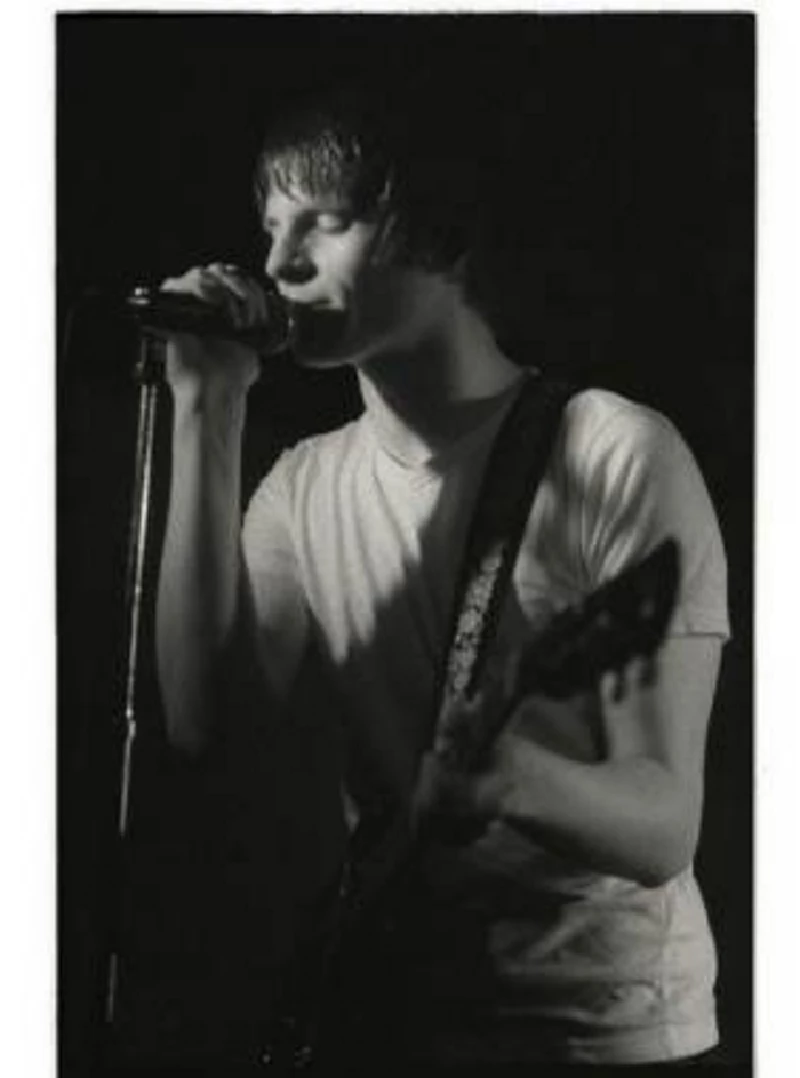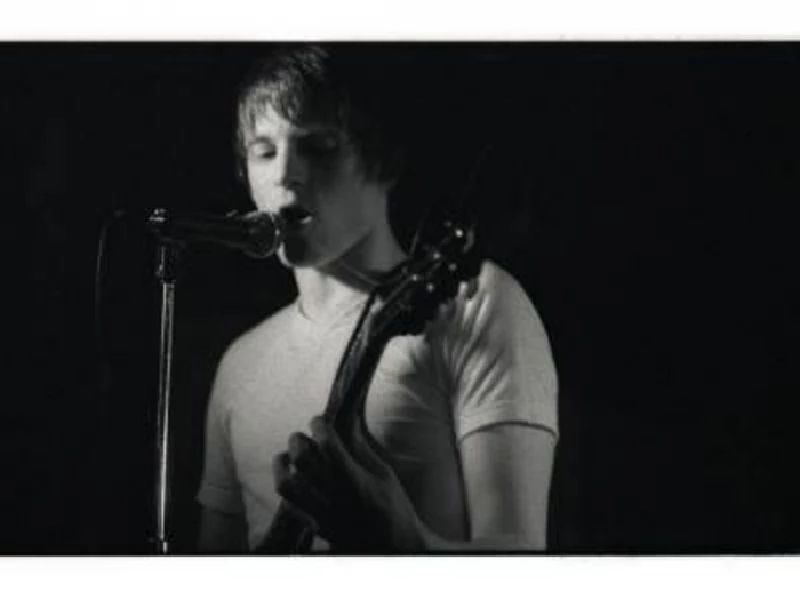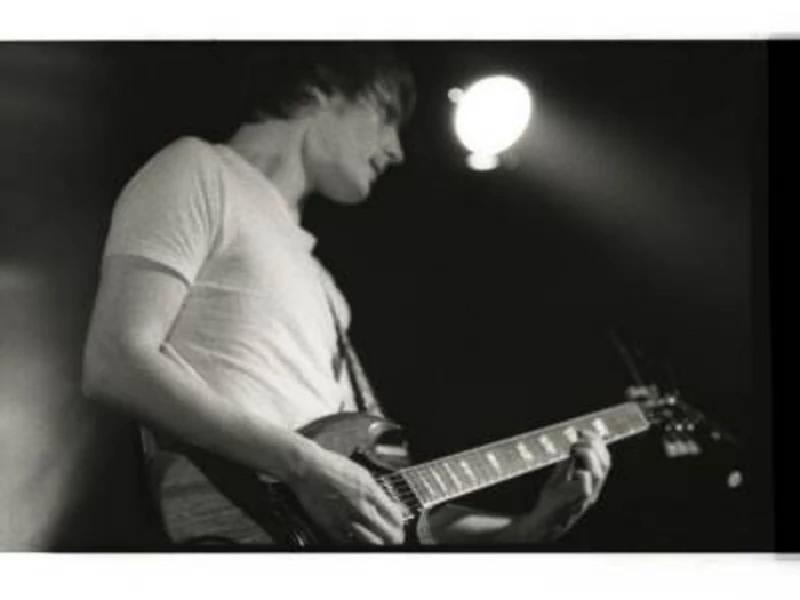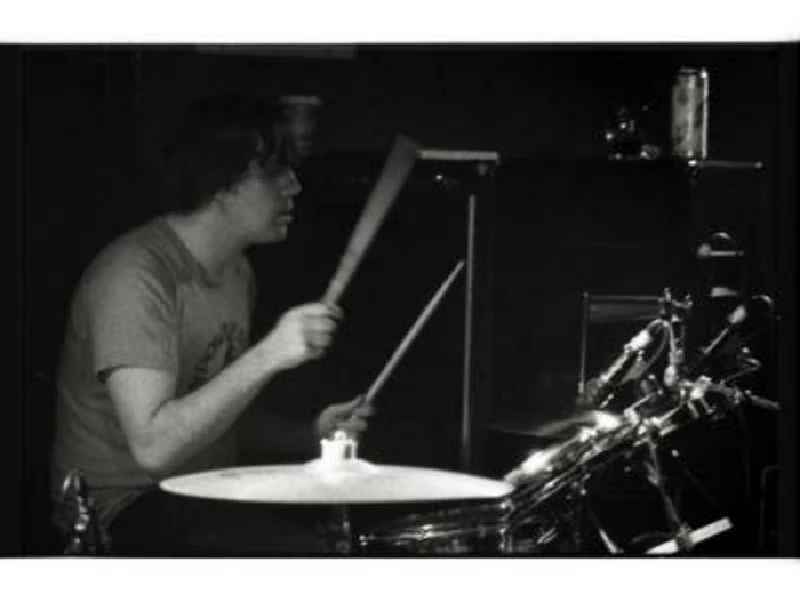Miscellaneous - Interview
by John Clarkson
published: 11 / 11 / 2004

intro
Electronica act Pro Forma created a melancholic punk sound which they dubbed 'The Council House' and featured in its first line-up Franz Ferdinand's Paul Thomson. Founder member Simon Henderson speaks about its past and future
Pro Forma was formed in 2000 by Paul Thomson (programming, keyboards, vocals, guitar, drums), Simon Henderson (programming, guitar, keyboards, vocals) and Victoria Henderson (bass, vocals) out of the remnants of three Glaswegian groups, all of whom broke up within a month of each other. The group created a terse, melancholic punk sound which they dubbed 'The Council House ’ One critic described this early incarnation of Pro Forma as sounding like a cross between Joy Division and New Order, both of whom were acknowledged influences. The Council House sound combined the darkness of the former, with the dance beats of the latter. The scratchy synthesisers of the film director John Carpenter (‘Assault on Precinct 13’, ‘Halloween’ and ‘The Fog’), who composes all his films’ own music, were another dominant influence. In early 2002 Pro Forma made a brief, disastrous tour of Britain and Ireland. In August of that year they released a four song 12’ on the Oscarr label , which is owned by JD Witch and JG Wilkes, who also run Glaswegian club Optimo. Towards the end of the 2002 Thomson, however, decided to quit. He has since then gone on gain acclaim as the drummer in Franz Ferdinand. On the eve of his departure, Pro Forma expanded its membership to include Robert Johnston (guitar, programming) and Will Bradley (drums), both of whom had played with quirky Glaswegian art rockers Life Without Buildings. Bradley soon left to concentrate on his own music writing, and was replaced towards the end of 2003 by Colin Kearney, who had played with avant-garde act Eska. After a nearly two year absence, Pro Forma have recently begun touring again. American-in-London Lisa Blanning released at the beginning of Novermber on her label Tsk Tsk Records ‘Proforma’, a compilation of all the original line-up of the band's recordings, including the four songs on the 12’’, another song recorded for a sampler, and a video for one of the songs, ‘The Passion Prefix’. Pennyblackmusic spoke to Simon Henderson about the compilation, and Pro Forma’s past and future. PB : Pro Forma was born out of the ashes of three other Glaswegian bands. Who were these groups ? SH : Paul was playing in The Reefer at time, and Vic played in a band called Sour Tooth, who did a couple of split 7” inches. I played in a band called Hernandez, who did a lot of touring, but who didn’t actually get around to recording anything. All our bands had gigged solidly in Glasgow, and we had all played shows together at various points and become friends. We all came from different styles, but we were all in the same place with what we actually wanted to do at that point. We had all been playing in what were predominantly guitar groups. All of us, however, had been experimenting at different levels with electronica.. It made sense with us at that point to take things with Pro Forma further in that direction, as everyone was pretty burnt out on the guitar thing. PB : Did Pro Forma start experimenting with PCs and synths immediately? SH : We had maybe two or three rehearsals with Paul playing drums, Vic playing bass and me playing guitar. Nothing was really coming together though the way we wanted and so we fluked across and started experimenting with stuff on Paul’s PC. Everything came together so much more quicklythat way and started making a lot more sense. When you start writing on a different instrument to what you are used to, it can be such a different way of writing that it can be really inspiring. We all felt that we had hit dead ends with what we were doing before, and using keyboards and synths meant that the ideas we were all having in our heads were able to come out much more easily. PB : Why did you decide to call your sound ‘The Council House’ ? SH : It was slightly tongue-in-cheek. Within electronic music people create genres at the drop of a hat, and it was to do with that. It was also, because pretty much up until a few months before Paul left the band, we were all three of us really broke. We were all either working minimum wage jobs or unemployed at the time. We didn’t have any money at all. It was also a reference to the fact that everything was done really cheaply. The PC that Paul used was really, really old, and pretty much falling to pieces. Everything that we did was pretty much limited by the lack of money that we had. We had to rehearse in our houses because we didn’t have the cash to go into the rehearsal studios. If something broke which was an integral part of a song we often had to abandon the song because we couldn’t afford to get it fixed. PB : Although you were on absolutely no budget when you were recording the songs which appear on the CD, they are, however, very complex in terms of their time signatures and what is happening instrumentally. Obviously you put a lot of thought into them. Did you rehearse and improvise a lot during that period ? SH : Yeah, we did. Those songs had quite a long gestation period. The lack of limits with doing things on computers can be quite liberating. We had a lot of ideas and would just throw everything down. We would then sit back and think afterwards ‘Jesus, there’s about 60 tracks on this’. We would then wade through all these different ideas , and arrange them into something that actually worked. PB : The early Pro Forma sound has been described as a cross between Joy Division and New Order. Would you agree with that ? SH : That was a fairly common thread between all of us. We were all big Joy Division and New Order fans. There is a lot more in it than just that. In terms of a a signpost it is an understandable one though. PB : John Carpenter, who composes the soundtracks for all his own films, was an early influence as well. What was the attraction to you of his music? SH : The soundtracks to his movies have always really appealed to me. I first saw ‘Assault on Precinct 13’ when I was about 14, and it just stuck with me. What he does is really simple, but really effective. One of the reasons I started dabbling with synthesisers was because of his work. I grew up listening mainly to punk rock. John Carpenter was the first real non-guitar thing that I heard which seemed to have, possibly not the same ethos, but definitely a similarity in terms of sound to what I was then listening to, which was usually dark punk stuff. PB : There is a bleakness to a lot of the music on the CD as well. Was that something that you aimed for ? SH : It wasn’t deliberate, but I think it was pretty much inevitable. We have all moved beyond the point we were at three years ago in which we were living totally hand to mouth. The way you live your life definitely has a huge bearing on the music you turn out. Part of that bleakness definitely came from having to scrabble for money for rent at the end of the month. While I recognise that it would be pretty insulting to think that there were people who weren’t a lot worse off than any of the three of us were at the time-I wouldn’t want to over state anything in those terms-life was definitely a lot more difficult than it was now. PB : You went on tour in mid 2002 and played dates in London and Ireland. It wasn’t , however, a very successful tour. What went wrong ? SH : It was pretty hard. Let’s put it that way (Laughs). The first night of the tour we had the van broken into. Paul had his passport and all of his clothes stolen. We also ran into various technical difficulties across Britain. We didn’t have any kind of financial backing for it, so we were pretty much doing it off from whatever money we had ourselves. Some of the shows were really good , but some of them were very sparsely attended. PB : That summer you put out four of the tracks that appear on the CD on a 12” on the Oscarr label. How did you become involved with them ? SH : We all went to Optimo quite regularly, and after a while got to know Keith and Johnny who DJ there and run Oscarr. They asked us to play the club one week, and after we played they were keen to do something with us. PB : Which of the tracks on the compilation didn’t actually appear on the 12” ? SH : It was ‘Ist Schon’, the final track. That was originally released on a CD that came on a cover mount on a Dutch art magazine,. The video for ‘Passion Prefix’ was released as part of a video project between various Glasgow bands and various Glasgow artists. It came out , like the 12”, in 2002 as well. PB : The group ran into problems with the 12”. Half of its pressing was lost. What happened there ? SH : About three or four months after the record was released the distributor went into liquidation, and all the stocks that were at its warehouse were seized. They were lost until just two or three months ago when Oscarr finally managed to get them back. There was a good year and a half when they disappeared completely off the face of the Earth and became impossible to get a hold of. PB : It got towards the end of that year, and you played a final gig in Edinburgh at the La Belle Angele nightclub, which burnt down a week later. That was actually the last gig there before it caught fire. SH : Yeah, which was a bit bizarre (Laughs). PB : And then the original line of the group split up and Paul left. Why did that happen? SH : Towards the end of that year Paul had started playing with Franz Ferdinand. He had also fallen in love with the woman who is now his wife and who lived in London. He was starting to spend a lot of time there both with her and with Franz Ferdinand. We had all reached a point even before he left in which we had all been talking about changing the way things were going, and the way in which we did stuff. In much the same way in which we had started the band with all of us having become burnt out by the limits of doing stuff largely in guitar bands, we had all become burnt out and jaded with working with electronica. Whenever we played live we felt really limited playing along to a backing track. We felt that we didn’t have much flexibility in the way that we could do things. We had been talking for some time before he left about getting another couple of members, and a live drummer and trying to change the way that we wrote and worked together as a band. Franz Ferdinand were spending so much time in London that it basically made sense for Paul to leave. This was about the time they were beginning to attract an interest, and he was getting all that he wanted from music from them and from being in London. Even, however. before he actually officialy left we had actually already taken on board Will and Robert. PB : Will has now gone from the band and been replaced by Colin Kearney. What do you think the new members have brought to the band ? SH : I think that it has given us a completely different outlook. It has completely changed the dynamics of it both in terms of the way we write and the way that we perform. It has really freed us so that in terms of dynamics we can do things a lot differently. PB : How does the sound of the new line-up differ from the old line-up ? SH : While it is still electronic and we still have programmed drums, the freedom of having live drums has definitely given us a greater degree of fluidity. When you’re not dependent on a computer or a drum machine and on the limitations of a particular PA system, either in a practice room or at a gig, you can create a lot more musical tension. It releases you as well to be able to layer instruments up a lot more. We now have a set up where we’re not limited at all. We’re not restricted with the limitations of being a regular guitar band because we can still layer things on the computer and. therefore, have a much fuller sound, but we also have all the dynamics and range of a regular live act. It has also allowed us to explore a much wider range of influences because we are not tied to either. We can, therefore, envelop all of it. There are still some commonalities between the two line-ups, but, if you take some of the songs from the original line-up, it’s almost as if we have turned them on their head. I have started, for example, listening quite a lot to Fela Kuti, and there’s a couple of tracks which appeared on the 12”, which now when we play live, have much more of an Afro beat. PB : Who else do you see as your major influences nowadays ? SH : People tend to say is there is still an element of New Order and Joy Division . There is a lot of Fela Kuti and Talking Heads, and also some Brian Eno. All four of us appreciate Brian Eno and the Talking Heads’ idea of having things go along in a particular way and then ending up by flipping them on their head. We have been trying to do that quite a lot with our music. PB : You have recently after taking an extended break started playing gigs again, and recently played your first London show in two years. Are you going to be playing a lot more shows in the future ? SH : It is definitely something that we are going to try to do a lot more of. It took us quite a while to come to grips with working things out as a live band, and then trying to work out with the new people exactly what balance to strike. That took up the vast majority of last year, and then when Will left that set us back also because it took Colin a while to get up speed with everything. Now though we want to play a lot more live shows. Things all together are very positive. PB : Why did you decide to re-release on CD all the old Pro Forma recordings ? Was it simply to compile them all together on CD as previously they had all come out on vinyl or compilations ? SH : Yeah, basically that was it. it was very frustrating for all of us that it was nearly impossible to actually find any of them. Lisa at Tsk Tsk had always expressed an interest in working with us. We first met her two and a half years ago at a Glasgow show we did with Erasa Errata. They put out the first release on her label. She was on tour with them and has always been quite serious since about working with us. We just wanted to get it out there. A lot of the new material makes sense in context of the old material PB : Do you see putting out the old stuff as putting a seal on things as well ? SH : I think it is partly putting out a seal of things. I am proud of the recordings. All three of us that were involved are proud of them and proud of what we achieved with those songs. There will be people out there who will be interested in hearing it. as well because of Paul’s success with Franz Ferdinand. I think all of us would hate to see any of those people having to pay ridiculous prices to get stuff, or to spend a lot of time tracking them down when we could make them easily available. That was one of the points of doing it, just to make them available. PB : Will the band be putting out more recordings soon ? SH : We are hoping to do some recording when we next go down to London. We’re hoping to have a new four track EP out next year. PB : Will that come out on Tsk Tsk ? SH : At the moment that’s the plan. Yes. PB : And finally after that what else have you got planned ? SH : Hopefully we’ll start working on an album. We hope to get enough material together to record a LP at some point next year. In hopefully about May time we’ll go and record it and then perhaps put it out at the end of the summer next year. PB : Thank you for your time.
Picture Gallery:-



most viewed articles
current edition
Carl Ewens - David Bowie 1964 to 1982 On Track: Every Album, Every SongJohn McKay - Interview
Editorial - July 2025
Billie Eilish - O2 Arena, London, 10/7/2025
Visor Fest - Valencia, Spain, 26/9/2025...27/9/2025
Hothouse Flowers - Photoscapes
Bathers - Photoscapes 2
Bathers - Photoscapes 1
Colin Blunstone - Thalia Hall, Chicago, 16/7/2025
Cleo Laine - 1927-2025
previous editions
Heavenly - P.U.N.K. Girl EPBeautiful South - Ten Songs That Made Me Love...
Trudie Myerscough-Harris - Interview
Pixies - Ten Songs That Made Me Love...
Boomtown Rats - Ten Songs That Made Me Love....
Fall - Hex Enduction Hour
Sam Brown - Interview Part 2
Doris Brendel - Interview
Blues and Gospel Train - Manchester, 7th May 1964
Donovan - Ten Songs That Made Me Love...
most viewed reviews
current edition
Sick Man of Europe - The Sick Man of EuropeAmy Macdonald - Is This What You've Been Waiting For?
Phew, Erika Kobayashi,, Dieter Moebius - Radium Girls
Alice Cooper - The Revenge of Alice Cooper
Blueboy - 2
Lucy Spraggan - Other Sides of the Moon
Cynthia Erivo - I Forgive You
Davey Woodward - Mumbo in the Jumbo
Philip Jeays - Victoria
Bush - I Beat Loneliness
Pennyblackmusic Regular Contributors
Adrian Janes
Amanda J. Window
Andrew Twambley
Anthony Dhanendran
Benjamin Howarth
Cila Warncke
Daniel Cressey
Darren Aston
Dastardly
Dave Goodwin
Denzil Watson
Dominic B. Simpson
Eoghan Lyng
Fiona Hutchings
Harry Sherriff
Helen Tipping
Jamie Rowland
John Clarkson
Julie Cruickshank
Kimberly Bright
Lisa Torem
Maarten Schiethart